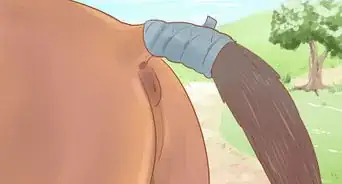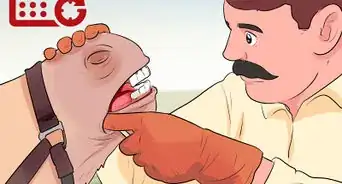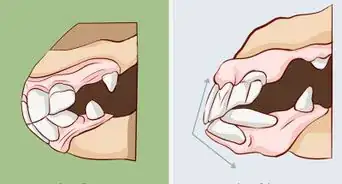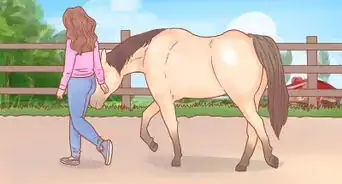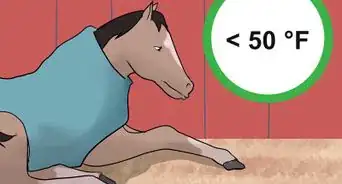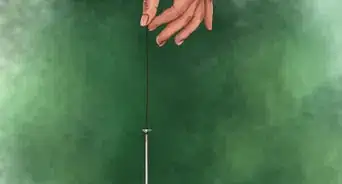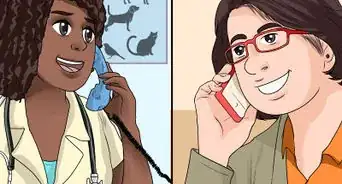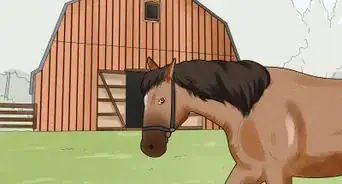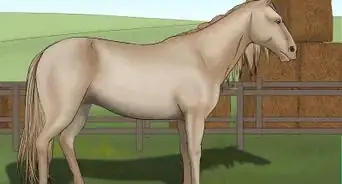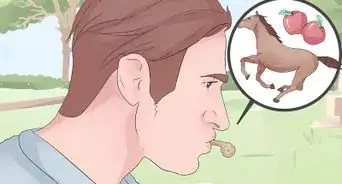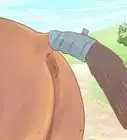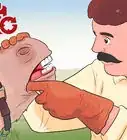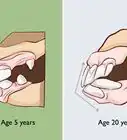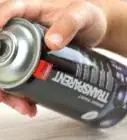This article was co-authored by Kate Jutagir. Kate Jutagir is an Equestrian Specialist, Hunter/Jumper Trainer, and the Owner of Blackhound Equestrian, a premier training barn located on 65 acres in Castro Valley, California. Originally designed to be a riding school used as a springboard for dedicated students into careers in the sport, Blackhound Equestrian has grown into a hunter/jumper training program for all levels focusing on providing a solid foundation needed for personal advancement in the sport. Kate has over 25 years of equestrian instruction and training experience. Her focus on developing horse and rider partnerships provides a complete equestrian education for both beginners and advanced riders alike.
There are 9 references cited in this article, which can be found at the bottom of the page.
This article has been viewed 65,068 times.
If your mare is usually pleasant and reasonable, but her behavior changes drastically when she’s in heat, you may not know what to do. Although your mare’s hormones can cause her to act pretty strangely when she is in heat, there are some things you can do (with your veterinarian’s guidance) to manage your mare during this time.
Steps
Working With Your Mare When She is in Heat
-
1Select easy tasks for your mare to perform when she is in heat. When your mare’s hormones are surging, it will be difficult for her to focus on tasks that she would normally be able to do quite easily. In addition, she will not want to be as active when she is in heat. For these reasons, you may need to adjust your mare’s work schedule when she in heat.
- Pick exercises that can help her focus, such as jumping combinations or changes in gait or direction. Give her something that she already knows how to do, since she probably won’t be able to learn anything new while she is in heat.[1]
-
2Do not approach your mare from behind. With your mare being extra sensitive to touch while she is in heat, especially near her hind end, avoid approaching her from where she cannot see you.[2] If your mare has a winking vulva when she is in heat, the constant opening and closing of her vulva could lead to an uncomfortable condition called pneumovagina (air enters the vagina). Pneumovagina can make your mare very irritable, so it would be best to stay away from her back end as much as you can.[3]
-
3Groom your mare from front to back. Depending on your method for grooming your mare, you may need to readjust it while she is in heat. If you do not do so already, begin grooming her at her neck and shoulders, where she will probably not be too sensitive to your touch. Slowly and carefully, work your way back to her flank.[4]
- Pay close attention to your mare’s body language when grooming her. If she is growing increasingly agitated, especially as you work your way back on her body, stop your grooming session.
-
4Keep your mare away from any stallions if you're not planning to breed her. If you have a stallion on the property, keep the mare safely away from the stallion. Keep the stallion in a fenced-in area, and make sure the fence is high enough that he can't jump it and strong enough that he can't break it. Otherwise, you might end up with a pregnant mare that you didn't plan on.[5]
- Do not keep the mare and the stallion in adjacent pastures or pens.[6]
- If you are not familiar with horses, it may be better to get guidance from someone who has experience with horses.[7]
- Read books about horse care and horse behavior.[8]
- Spend more time with horses and interact with them to learn about all their aspects.[9]
Using Hormone Therapy to Deal with a Mare in Heat
-
1Discuss hormone therapy with your veterinarian. Hormone therapy is a great way to deal with a mare in heat, particularly if her heat-related behaviors are negatively affecting her training schedule or ability to compete. Progesterone has been shown to be the most effective hormone to suppress a mare’s heat, but estradiol (a form of estrogen) and oxytocin can also be effective.[10] [11] Following examination, your veterinarian will be able to recommend the ideal hormone therapy treatment plan for your mare.
- Since these synthetic hormones mimic your mare’s naturally circulating hormones, it is unlikely that you will run into problems with competition drug rules.[12] However, you should still check the rules before starting your mare on hormone therapy.
- If your mare's heat-related behaviors are merely annoying, and don't have a major impact on her training or competitiveness, then hormone therapy is probably not necessary.
-
2Give your mare progesterone. Naturally, progesterone is highest during diestrus. The synthetic form of progesterone will keep your mare in diestrus and prevent her from entering estrus. The most common form of commercially available progesterone is Regu-Mate, a daily synthetic progestin.[13]
- Regu-Mate comes in an oral formulation, which you can either add to your mare’s feed or administer directly into her mouth via a syringe. The oral formulation is oily and can be messy, so adding it to her feed may be a little easier.[14]
- Regu-Mate is also injectable. However, the daily intramuscular injection could cause soreness and scar tissue development at the injection site.[15]
- With the injectable formulation, it will take about 24 hours to see an effect.[16] Heat is usually suppressed within 3 days with the oral formulation.[17]
- You can stop giving Regu-Mate at any point. When you stop giving it, your mare will return to heat within about 5 days.[18]
- You must wear nonporous gloves when giving your mare Regu-mate! It can absorb into human skin and cause abnormal cycles in women, as well as infertility in both men and women.[19]
-
3Add estradiol to your mare’s hormone therapy. On its own, progesterone may not be very effective in reducing your mare’s irritability or other behavioral issues when she is in heat.[20] This is because progesterone does not stop your mare’s ovarian activity, meaning that follicles can continue to develop in her ovaries. The addition of estradiol 17ß would suppress follicular activity and thus may help address the behavioral problems.[21]
- A progesterone + estradiol hormone therapy regimen can be given in either a short- or long-acting formulation.[22] Your veterinarian will let you know which would be best for your mare.
-
4Consider giving your mare oxytocin. Oxytocin is another hormone that can prevent your mare from coming into heat by keeping her in diestrus. It is an injectable formulation that should be given twice a day for 14 days after your mare has ovulated (your veterinarian can help you make that determination). Oxytocin can keep your mare in diestrus for up to 30 days. She would likely tolerate the daily injections because of the small amount of drug that you would inject.[23]
- Oxytocin does not have many side effects and may actually be less expensive than other hormone therapy options.[24]
-
5Explore non-hormone therapy options. There are some other therapeutic options for dealing with a mare in heat. For example, you could give your mare herbal supplements. However, herbal supplements have not undergone rigorous scientific testing, and can have variable effectiveness. They may also violate medication rules in sporting associations, so check with these associations before giving your mare herbal supplements.[25]
- There are a number of herbs you could consider, including chaste tree berry (hormone level regulation), European angelica (reduction of unpleasant hormone-related symptoms), red clover (estrogen-like effects), and motherwort (reduction of irritability). Talk with your veterinarian before giving your mare herbal supplements.
- Surgical removal of your mare’s ovaries (‘Oophorectomy’) is another option, but should be a last resort.[26] Although your mare will stop cycling, she may still exhibit heat-related behavior.[27]
- Implantation of small, sterile marbles into a mare’s uterus has been shown to suppress estrus.[28] The marbles can keep a mare out of heat for up to 90 days, but this method has variable effectiveness.[29]
Recognizing When Your Mare Is in Heat
-
1Learn about a mare’s reproductive cycle. Mares are seasonally polyestrous, meaning their reproductive cycles occur at certain times of the year.[30] Typically, a mare’s cycling season will last from April through September. During these months, each cycle will last 18 to 23 days and the mare will be in heat for about 5 of those days.[31]
- A mare’s cycling may begin as early as March and end as late as October or November. Some mares may have a transition period before the start of the cycling season or at its end, causing them to show signs of being in heat for weeks at a time.[32]
- The part of a mare's cycle when she is not in heat is called diestrus.[33]
- Rarely, certain medical conditions (ovarian tumors, equine Cushing’s disease, uterine infection, poor nutrition) can cause abnormal cycling behavior.[34]
-
2Keep a daily journal of your mare’s behavior. During the course of one reproductive cycle, your mare’s behavior will ebb and flow. Recording her behavior—the good, the bad, and the ugly—each day will help you estimate where she is in her cycle, especially when she is in heat. Make recorded observations specific. For example, instead of writing ‘She misbehaved,’ write the details of her bad behavior (‘didn’t follow instructions,’ ‘tried to kick’).
- Keep the diary for about a month. Remember to include your mare’s behavior around other horses, especially stallions. This will help you and your veterinarian devise a strategy for managing your mare when she is in heat.
- Make the journal a team activity. Whoever is around your mare (yourself, trainers, caretakers) should record her behavior. It may even help to make a video recording of her behavior.[35]
-
3Identify which behaviors may be associated with being in heat. Mares can display a range of behaviors during their cycles. Behaviors associated with estrus include elevating the tail, ‘winking’ the vulva (vulva opens and closes), and squirting urine and mucus during a squat. A mare in heat may also decrease her overall activity level.[36]
- Gait abnormalities can also occur when a mare is in heat.[37]
- You may find that your mare is very distracted when she is in heat. She probably won’t follow your instructions very well when you are riding or training her.[38]
- When she in heat, your mare may also become more irritable and easily startled, as well as very sensitive to the touch. Ovulation can be painful, making your mare more sensitive.[39]
- Be aware that some of her bad behavior may actually be associated with her coming out of heat.
-
4Take your mare to your veterinarian. If your mare's behavior when she is in heat becomes dangerous to herself, other horses, or you, consider taking her to your veterinarian. He or she will evaluate your mare for reproductive soundness and determine whether reproductive abnormalities or other medical conditions are causing your mare’s dangerous behavior.[40]
- Your veterinarian will likely take blood samples and perform rectal palpitations on your mare to accurately determine where she is in her cycle.
- It may take several veterinary visits before your veterinarian can accurately diagnose your mare and devise an effective treatment plan.[41]
- Your mare may also need veterinary evaluation if her heat-related behaviors are affecting her ability to train and compete.
- Bring your daily journal to your veterinary visits.
Expert Q&A
Did you know you can get expert answers for this article?
Unlock expert answers by supporting wikiHow
-
QuestionHow can I care for my mare when she's in heat?
 Jessica RudeJessica Rude is an Equine Expert currently working on a cutting horse ranch in Valley View, Texas as well as a horseback riding center in Princeton, Texas. Previously, she was a Trail Guide and Wrangler at a camp and retreat center In Dallas, Texas, and an Equine Breeding Barn Manager at a reining ranch in Tioga, Texas. Jessica holds a Bachelor’s degree in Animal Science with an emphasis in Equine Science from Tarleton State University. She has studied equine nutrition, reproduction, and management. Jessica specializes in equine breeding as well as instructing horseback riding lessons, leading trail rides, recognizing equine illnesses, and administering treatments.
Jessica RudeJessica Rude is an Equine Expert currently working on a cutting horse ranch in Valley View, Texas as well as a horseback riding center in Princeton, Texas. Previously, she was a Trail Guide and Wrangler at a camp and retreat center In Dallas, Texas, and an Equine Breeding Barn Manager at a reining ranch in Tioga, Texas. Jessica holds a Bachelor’s degree in Animal Science with an emphasis in Equine Science from Tarleton State University. She has studied equine nutrition, reproduction, and management. Jessica specializes in equine breeding as well as instructing horseback riding lessons, leading trail rides, recognizing equine illnesses, and administering treatments.
Equine Expert
-
QuestionWill a mare behave completely different than normal when in heat?
 HopeCommunity AnswerThe mare may not be completely different, but she will be very pushy, and will raise her tail and 'wink' frequently.
HopeCommunity AnswerThe mare may not be completely different, but she will be very pushy, and will raise her tail and 'wink' frequently. -
QuestionDoes a mare stop going into heat when she is older?
 Community AnswerNo. Mares always have heat cycles. Some are more mild than others.
Community AnswerNo. Mares always have heat cycles. Some are more mild than others.
Warnings
- Do not administer Regu-Mate if you are pregnant.[46]⧼thumbs_response⧽
- Do not give your mare progesterone if she has a uterine infection or her uterine is inflamed. Progesterone could worsen the infection or inflammation.[47]⧼thumbs_response⧽
- When you take your mare off Regu-Mate, she may experience long-term cycling abnormalities.[48]⧼thumbs_response⧽
- Ovariectomies are expensive and not without risk.[49]⧼thumbs_response⧽
References
- ↑ http://www.equisearch.com/article/mares-in-heat-19155
- ↑ http://www.equisearch.com/article/mares-in-heat-19155
- ↑ http://www.aaep.org/info/horse-health?publication=911
- ↑ http://www.equisearch.com/article/mares-in-heat-19155
- ↑ Jessica Rude. Equine Expert. Expert Interview. 18 September 2020.
- ↑ Jessica Rude. Equine Expert. Expert Interview. 18 September 2020.
- ↑ Kate Jutagir. Equestrian Specialist & Trainer. Expert Interview. 31 March 2020.
- ↑ Kate Jutagir. Equestrian Specialist & Trainer. Expert Interview. 31 March 2020.
- ↑ Kate Jutagir. Equestrian Specialist & Trainer. Expert Interview. 31 March 2020.
- ↑ http://www.horseandhound.co.uk/horse-care/vet-advice/dealing-with-moody-mares-66911
- ↑ http://practicalhorsemanmag.com/article/managing-mares-in-heat-11641
- ↑ http://practicalhorsemanmag.com/article/managing-mares-in-heat-11641
- ↑ http://www.aaep.org/info/horse-health?publication=911
- ↑ http://www.horseandhound.co.uk/horse-care/vet-advice/dealing-with-moody-mares-66911
- ↑ http://www.thehorse.com/articles/30998/mares-and-hormones
- ↑ http://practicalhorsemanmag.com/article/managing-mares-in-heat-11641
- ↑ http://www.thehorse.com/articles/30998/mares-and-hormones
- ↑ http://practicalhorsemanmag.com/article/managing-mares-in-heat-11641
- ↑ http://www.equisearch.com/article/mares-in-heat-19155
- ↑ http://www.equisearch.com/article/mares-in-heat-19155
- ↑ http://practicalhorsemanmag.com/article/managing-mares-in-heat-11641
- ↑ http://practicalhorsemanmag.com/article/managing-mares-in-heat-11641
- ↑ http://www.aaep.org/info/horse-health?publication=911
- ↑ http://practicalhorsemanmag.com/article/managing-mares-in-heat-11641
- ↑ http://practicalhorsemanmag.com/article/managing-mares-in-heat-11641
- ↑ http://practicalhorsemanmag.com/article/managing-mares-in-heat-11641
- ↑ http://www.horseandhound.co.uk/horse-care/vet-advice/dealing-with-moody-mares-66911
- ↑ http://www.horseandhound.co.uk/horse-care/vet-advice/dealing-with-moody-mares-66911
- ↑ http://www.aaep.org/info/horse-health?publication=911
- ↑ http://www.thehorse.com/articles/30998/mares-and-hormones
- ↑ http://www.equisearch.com/article/mares-in-heat-19155
- ↑ http://www.thehorse.com/articles/30998/mares-and-hormones
- ↑ http://www.equine-reproduction.com/articles/estrous.htm
- ↑ http://www.thehorse.com/articles/30998/mares-and-hormones
- ↑ http://www.horsetalk.co.nz/2015/08/01/mares-behaving-badly/#axzz42dJjTavB
- ↑ http://www.equisearch.com/article/mares-in-heat-19155
- ↑ http://www.thehorse.com/articles/30998/mares-and-hormones
- ↑ http://practicalhorsemanmag.com/article/managing-mares-in-heat-11641
- ↑ http://www.equisearch.com/article/mares-in-heat-19155
- ↑ http://www.thehorse.com/articles/30998/mares-and-hormones
- ↑ http://www.horsetalk.co.nz/2015/08/01/mares-behaving-badly/#axzz42dJjTavB
- ↑ http://www.equisearch.com/article/mares-in-heat-19155
- ↑ http://practicalhorsemanmag.com/article/managing-mares-in-heat-11641
- ↑ http://www.horsetalk.co.nz/2015/08/01/mares-behaving-badly/#axzz42dJjTavB
- ↑ http://www.equisearch.com/article/mares-in-heat-19155
- ↑ http://practicalhorsemanmag.com/article/managing-mares-in-heat-11641
- ↑ http://practicalhorsemanmag.com/article/managing-mares-in-heat-11641
- ↑ http://www.equisearch.com/article/mares-in-heat-19155
- ↑ http://www.horseandhound.co.uk/horse-care/vet-advice/dealing-with-moody-mares-66911
About This Article
If you suspect your mare is in heat, watch her for gait abnormalities, an elevated tail, and sensitivity to touch, which are all signs that a mare is in estrus. While she’s in heat, avoid strenuously exercising her and never approach her from behind, since it might startle your already irritable mare. You don't have to do anything while your mare is in heat, but if her behavior becomes harmful to herself or her caretakers, consult a veterinarian. For tips from our Veterinary reviewer on grooming a mare while she is in estrus, read on.
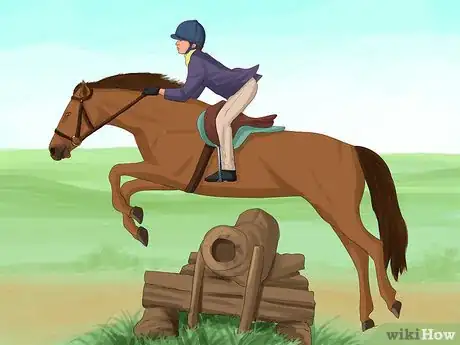
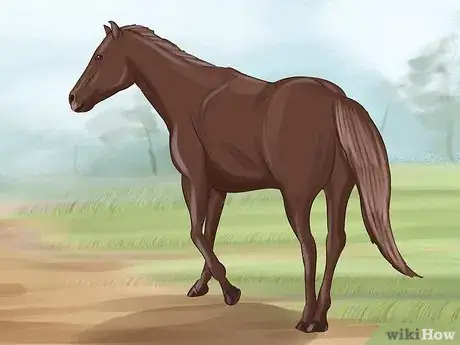
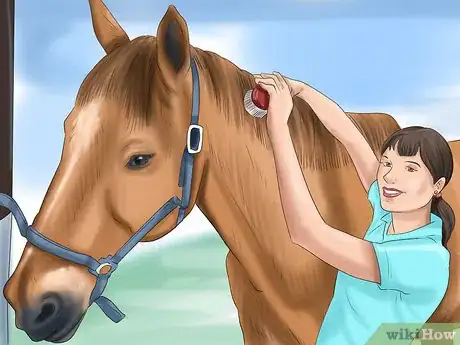


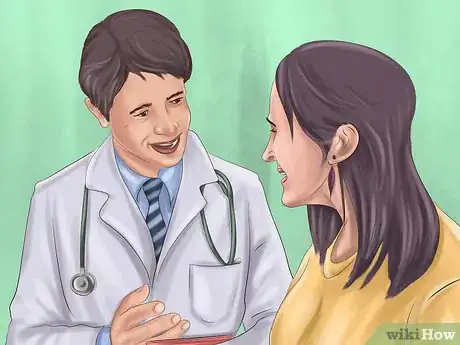
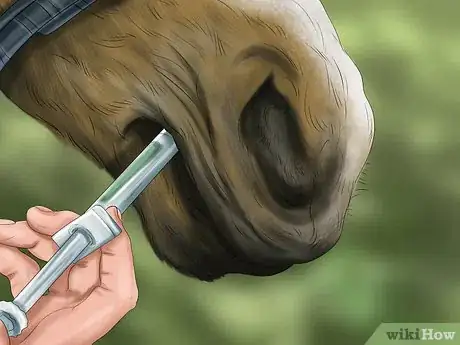
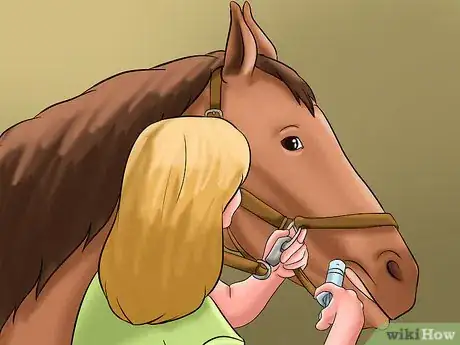
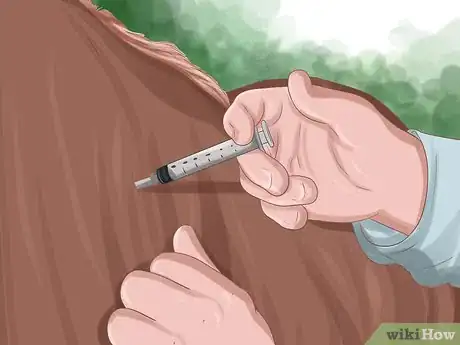
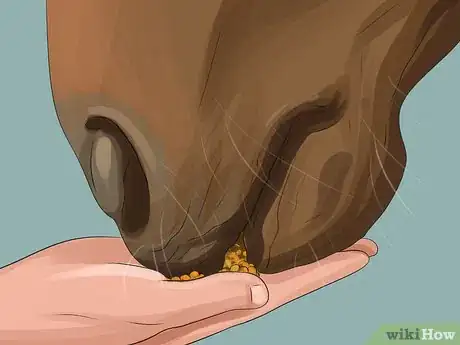
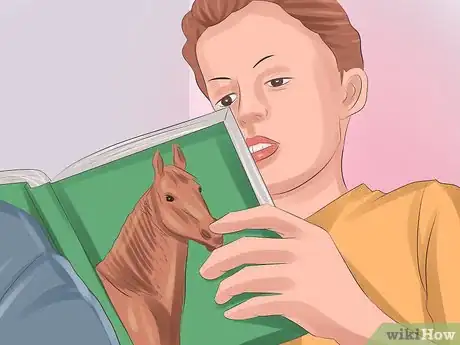
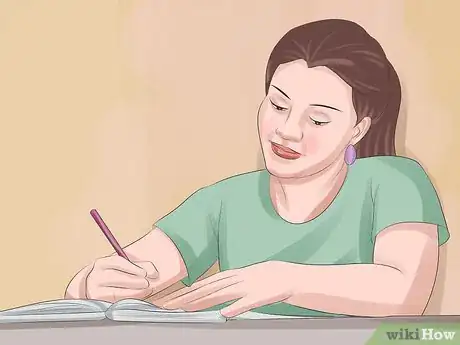
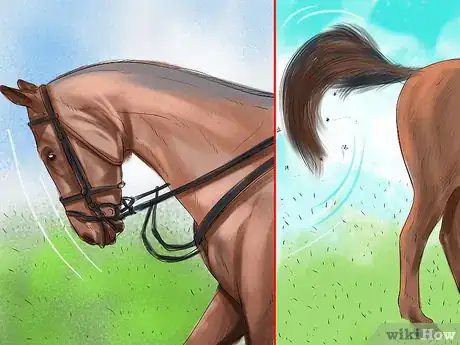
-in-Horses-Step-4-Version-2.webp)
